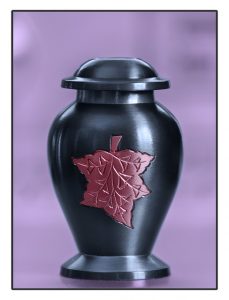Cremation Confusion: Is it Unscriptural for a Christian to be Cremated?
 Photo credit: originalpozer via Interior Design / CC BY-NC-SA |
What, dear readers, is your experience with cremations? I would like very much to hear from readers who are willing to talk about the subject, and I hope to share some of your thinking in a blog soon. The national average for cremations as a percentage of all funerals has skyrocketed from 5% in 1962, to 25.5% in 2000, to 48.2% in 2015, according to the National Funeral Directors Association. The primary driver for this rapid uptick is the continuing climb of the cost of traditional funerals. In addition to costs, according to the Knoxville News (Knoxville, TN): 1) convenience is an important influencer. Many families have siblings and relatives living some distance away in different parts of the country. With cremation, the memorial service can be delayed for weeks, or even a month or more to allow family members time to make arrangements and attend the service. Environmental concerns is another factor. One person said ” We do not have to take up precious land and spend insane amounts of dollars to be buried.” 2) Another reason is that the stigma of cremation that once turned people off has all but disappeared in American culture. 3) Jim Safewright of Cremation Options in Knoxville says the changes in religious acceptance is “the big reason for the growth” of cremations.”
I admit that I can make a strong Biblical case for the New Birth, for example, but thus far in my study of the scriptures I cannot make an equally tight Scriptural case for or against cremation.
Consider this scenario. Many Christians over the centuries of the Lord’s church have given their lives as martyrs by being burned at the stake. Surely none of us believe that will be a problem to the Lord in the Great Resurrection. At the same time, Pentecostals take a very high view of the human body as a temple of the Holy Spirit. Does that high purpose of the body as a temple of the Spirit suggest traditional burial is more respectful because a body has been a temple of the Holy Spirit?
Please send my your thoughts on this or any other element of this soaring practice in American funerals. I want to hear from you.
Timothy George some years ago wrote an excellent article for Christianity Today on the subject. His thinking is still cutting edge, and his article follows. When you write me, you might also want to respond to something Dr. George has written. — Pastor Frank
====================================================================
Cremation Confusion: Is it Unscriptural for a Christian to be Cremated?
By: Timothy George / May 21, 2002
Originally published at http://www.christianitytoday.com/ct/2002/may21/27.66.html
The ancient world knew four methods of disposing of the bodies of the dead. Cremation was the normal practice of Greeks and Romans. Many of them believed in the immortality of the soul [but not the body] and saw no reason to give special attention to the body. Hindus, with their doctrine of reincarnation, still practice cremation. At the other extreme were the Egyptians, who mummified their dead, preserving the corpse indefinitely.
As the catacombs in Rome attest, the early Christians insisted on burying their dead. Christian gravesites were called coemeteria (cemeteries), which literally means “sleeping places,” reflecting belief in a future resurrection. Early liturgies for the dead included the reading of Scriptures, prayers, hymns, and almsgiving for the poor.
Why were Christians so concerned about proper disposal of the body? Here are four reasons:
(1) The body of every human was created by God, bore his image, and deserved to be treated with respect because of this.
(2) The centrality of the Incarnation. When the Word became flesh, God uniquely hallowed human life and bodily existence forever.
(3) The Holy Spirit indwelt the bodies of believers, making them vessels of honor.
(4) As Jesus himself was buried and raised bodily from the dead, so Christians believed that their burial was a witness to the resurrection yet to come.
Of course, many martyrs were burned to death, but Christians believed God would bring them forth unimpaired at the resurrection. “We do not fear any loss from any mode of sepulture,” declared Minucius Felix, “but we adhere to the old and better custom of burial.” In the context of the early church, when cremation was associated with pagan rituals and unbiblical beliefs, burial seemed to be a more loving and reverent way to bear witness to God’s ultimate victory over death.
But what about today? The first cremation in America took place in 1876, accompanied by readings from Charles Darwin and the Hindu scriptures. For many years, relatively few persons (mostly liberals and freethinkers) chose cremation. But that has changed dramatically. Only 5 percent of Americans were cremated in 1962; by 2000 it was 25.5 percent. In Japan, where burial is sometimes illegal, the cremation rate is 98 percent. The rise in cremations reflects many factors: concern for land use; the expense of traditional funerals; the loss of community and a sense of “place” in modern transient society; and New Age-type spiritualities.
While the weight of Christian tradition clearly favors burial, the Bible nowhere explicitly condemns cremation. Since 1963 the Roman Catholic Church has permitted cremation while “earnestly recommending” burial as the preferred mode of disposal. Billy Graham has noted (what Christians have always believed) that cremation cannot prevent a sovereign God from calling forth the dead at the end of time.
The Bible should not be used as a proof text either for the necessity of burial or for “cremation on demand.” True, there are several examples of cremation in the Old Testament (Achan, Joshua 7:25; Saul, 1 Samuel 31:12; the King of Edom, Amos 2:1), but they involved God’s judgment and curse. When Paul offered his body to be burned he was speaking of martyrdom, not cremation (1 Corinthians 13:3).
When Jesus said, “Let the dead bury the dead,” he was describing the cost of discipleship, not the cost or method of funerals.
The real question for Christians is not whether one is buried or cremated but the meaning given to these acts. Our modern funeral customs tend to anesthetize us from the ugly reality of death with soft music, plush carpets, and expensive caskets.
The Presbyterian preacher George Buttrick once said, “There is nothing more incongruous than dressing up a corpse in a tuxedo!” Cremation, too, can be done in ways that desecrate rather than respect the dead. For example, one can now order designer urns in which elements of a loved one’s “cremains” are mixed with clay and glazed to create a piece of lovely pottery!
Whether final disposition is by burial or cremation, the Christian church should offer a funeral liturgy in which the reality of death is not camouflaged, and the resurrection of the body is affirmed. We solemnize the departure of our loved ones by reminding ourselves that we brought nothing into this world, and that we can carry nothing out. “Earth to earth, ashes to ashes, dust to dust; in sure and certain hope of the resurrection unto eternal life, through our Lord Jesus Christ.”

